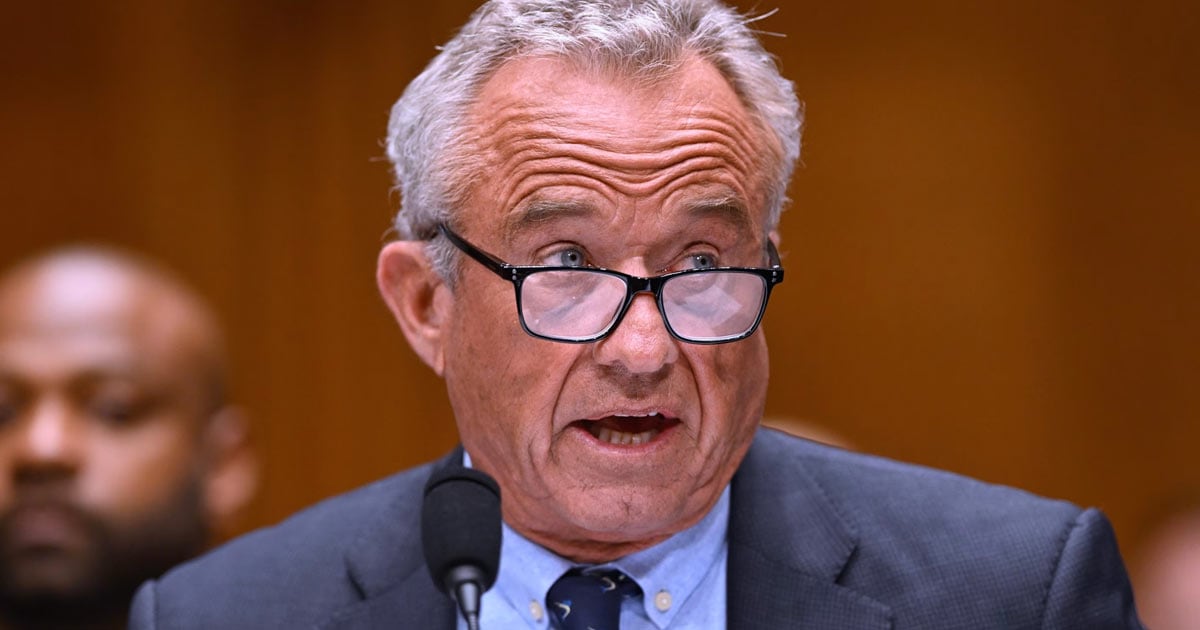President Donald Trump’s Robert F. Kennedy Jr.-led Make America Healthy Again Commission has just released its first major report on the state of chronic disease among American children.
The highly anticipated Make America Healthy Again (MAHA) report blames the spike in childhood health issues on a host of variables.
In particular, the report targets foods with added chemicals and an increase in the prescribing of pharmaceuticals to young kids.
The MAHA report, released Thursday, asserts:
“After a century of costly and ineffective approaches, the federal government will lead a coordinated transformation of our food, health, and scientific systems.
“This strategic realignment will ensure that all Americans—today and in the future—live longer, healthier lives, supported by systems that prioritize prevention, wellbeing, and resilience.”
Health and Human Services Secretary Robert F. Kennedy Jr. serves as chair of the commission.
Kennedy attended a call with reporters earlier Thursday.
He explained that the MAHA report is a “diagnosis” of the state of U.S. health.
RFK Jr. added that the “prescription” for the ongoing issues will be released in 100 days at the end of August in the form of policy recommendations for the federal government.
The report’s key findings include:
- Teenage depression nearly doubled from 2009 to 2019
- More than one in five children over the age of 6 is now considered obese
- One in 31 children is being diagnosed with autism by age 8
- Childhood cancer has spiked by 40% since 1975
“Over 40% of the roughly 73 million children (aged 0-17) in the United States have at least one chronic health condition, according to the CDC, such as asthma, allergies, obesity, autoimmune diseases, or behavioral disorders,” the report stated.
“Although estimates vary depending on the conditions included, all studies show an alarming increase over time.”
In addition, MAHA commission members warned that chronic diseases have a chilling effect on national security.
Roughly 75% of America’s youth aged 17–24 do not qualify to serve in the military due to obesity, asthma, allergies, autoimmune diseases, or behavioral disorders, they said.
In the phone call with reporters, U.S. Food and Drugs Commissioner Marty Makary said:
“We now have the most obese, depressed, disabled, medicated population in the history of the world, and we cannot keep going down the same road.
“So this is an amazing day,” he noted.
“I hope this marks the grand pivot from a system that is entirely reactionary to a system that will now be proactive.”
The report itself pointed to a handful of variables leading to what Kennedy and other Trump administration leaders called a “chronic disease crisis,” including a “food system (that) is safe but could be healthier;” exposure to environmental chemicals such as pesticides outside or microplastics in food consumed; as well as a culture shift that moved kids from playing outside to being glued to their phones or tablets.
“American children are highly medicated — and it’s not working,” the report adds.
The report found that prescribing medication to children has skyrocketed in recent history.
It notes a 250% increase in attention deficit hyperactivity disorder prescriptions between 2006 and 2016.
This spike comes despite scientific evidence that the prescriptions did not “improve outcomes long-term.”
The report also revealed a 1,400% increase in antidepressant prescriptions for kids between 1987 and 2014, and an 800% increase in antipsychotic medications for children between 1993 and 2009.
“These time trends significantly outpace more moderate increases seen in other developed countries,” the report found.
“Psychotropics for ADHD are one example, prescribed 2.5 times more in U.S. than in British children, and 19 times more than in Japanese youth.
“The crisis of overdiagnosis and overtreatment in children is therefore both empirically evident and proportionally specific to American youth.”
The report also detailed that fluoride, a toxic chemical frequently added to public drinking water supplies, was linked to developmental issues in kids.
It confirms a “statistically significant association between exposure to fluoride above recommended levels and reduced IQ levels in children.”
The EPA, the report said, is in the midst of reviewing fluoride data to potentially enact “revisions to the federal drinking water standard.”
By 2022, more than 60% of Americans — more than 70% of those on public water systems — were consuming fluoridated water, the report said.
A 2025 systematic review published in JAMA Pediatrics, analyzing 74 high-quality studies, found a statistically significant association between exposure to fluoride above recommended levels and reduced IQ levels in children.
The EPA is currently conducting a review of additional research that will inform any potential revisions to the federal drinking water standard.
Director of the National Institutes of Health (NIH) Jay Bhattacharya noted that the report underscores that America’s next generation of children is less healthy than their parents.
Bhattacharya warns that kids will subsequently live shorter lives if not addressed.
“What the report says is that the next generation of children will live shorter lives than their parents,” he said.
“For me, as a parent, that is absolutely shocking.
“The implication is that whatever is happening to our kids, the food that they eat, the environmental exposures they face, the medicines that they take to address the fact that they’re sick, are not translating over into making them healthier.
“And in fact, they are less healthy than their parents were at the same age.”
The report found, “Despite outspending peer nations by more than double per capita on healthcare, the United States ranks last in life expectancy among high-income countries — and suffers higher rates of obesity, heart disease, and diabetes.
“Today’s children are the sickest generation in American history in terms of chronic disease, and these preventable trends continue to worsen each year, posing a threat to our nation’s health, economy, and military readiness.”
The Trump officials stressed on the call that America’s food system is “100% safe.”
However, they explained that it could be even healthier, such as shifting from “ultraprocessed foods” that contain added “sugars, chemical additives, and saturated fats, while lacking sufficient intakes of fruits and vegetables.”
Kennedy added that the “holistic” review of U.S. health as it relates to children includes promoting a strong economy, citing that “weak economies kill people.”
The report “represents an invitation to the American people and the American press to have a complex conversation about a nuanced subject, including that environmental policy, good economic policy and good public health policy are ultimately 100% aligned,” Kennedy said.
“The reason for that, particularly regarding public health, is that a strong economy is a social determinant of public health,” he continued.
“Weak economies kill people.
“They make people sicker.
“Large public deaths make people sicker.
“These are all social determinants.
“And we learned during Covid that you can’t isolate the economy from the public health policy.”
Trump signed an executive order in February establishing the MAHA commission.
The commission is chaired by Kennedy and includes other agency leaders such as EPA chief Lee Zeldin, USDA’s Brooke Rollins, and VA Secretary Doug Collins.
The executive order directed the commission to release “an assessment that summarizes what is known and what questions remain regarding the childhood chronic disease crisis, and includes international comparisons.”
The commission will release its next report advising on how to tackle chronic health issues in the next 100 days, which falls on August 30.
Kennedy and Trump vowed on the campaign trail to “Make America Healthy Again.”
This pledge includes directing their focus on autism among the youth in recent years.
READ MORE – Canada Moves to Begin Euthanizing Children Without Parental Consent



Our comment section is restricted to members of the Slay News community only.
To join, create a free account HERE.
If you are already a member, log in HERE.